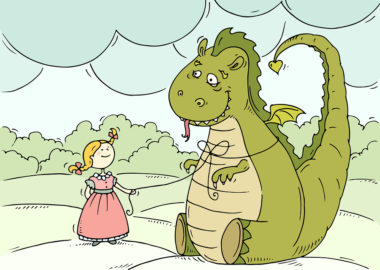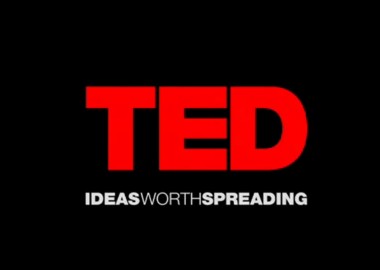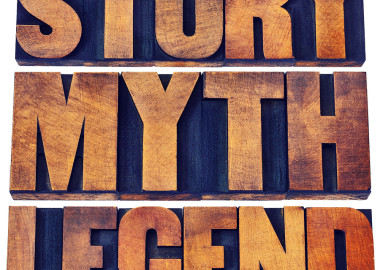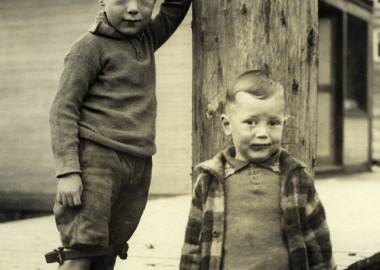As a storytelling agency, we’re often asked for resources and inspiration about all kinds of storytelling—and we find there are few better places to start than with TED Talks: highly consumable, wisdom-packed short videos by some of the sharpest minds on the planet. In among these videos are 6 TED Talks that teach storytelling for leaders.
The following collection represents a few of the leadership-focused gems (just over an hour’s worth of videos, along with a couple of articles that break down what makes a successful TED presentation) that we often share with our storytelling training clients.
We also very much recommend checking out our Storytelling Fundamentals: 5 TED Talks to Make You a Better Storyteller. Enjoy!
On Telling People Why They Matter
Drew Dudley: “Everyday Leadership” (6:10)
This short talk hinging on a personal story reminds us to ask ourselves as leaders—and as people—how our actions and words are perceived by others. It also serves as a reminder to express appreciation for the little things that make a big difference in our days and lives. Perhaps more interesting, from a storytelling perspective, notice how Drew Dudley uses a well-told story (it’s personal and authentic, rich with detail, follows a classic story arc, and features romance and humour) to prime us listeners to take action.
On the Structure of Great Speeches/Presentations
Nancy Duarte: “Uncovering the Structure of the Greatest Communicators” (18:12)
For Nancy Duarte, a writer and designer “who was fired up about presentations before it was cool to be fired up about presentations,” great storytelling in presentations is all about what is (as opposed to what could be). Comparing Martin Luther King’s iconic “I Have a Dream” speech with Steve Jobs’ introduction of the iPhone in 2007 (after studying hundreds of books, movies and speeches), Duarte says both speakers used a structure based on the gap between the current state of affairs (what is) and an ideal state (what could be). Both, she says, employed repetition, leading up to a call to action, and painting a picture of a “new bliss.” It’s an excellent and instructional talk, capped off by an affecting story of her own, urging the viewer to overcome their own obstacles to create their better story.
On Getting Heard
Julian Treasure: “How to Speak So That People Want to Listen” (9:54)
Sound expert Julian Treasure outlines the ‘7 deadly sins’ of speaking—and how you as a leader can communicate differently. Much of Treasure’s talk is devoted to presenting, but his advice for employing honesty, authenticity, integrity, and love in your daily speech and storytelling, too, is perfectly sound.
On Developing Courage As a Leader
Adam Grant: “The Surprising Habits of Original Thinkers” (15:25)
Are you always late to the party? Are you okay with not being first to market? Do you doubt yourself? A yes to any of those questions might mean that you are “an original,” according to Adam Grant, a professor of management and psychology at the Wharton School of the University of Pennsylvania. Originals, he says, “are nonconformists—people who not only have new ideas but take action to champion them. They’re people who stand out and speak up.” And why does this matter for storytelling? For leaders? You must stand up. Speak out. And be willing to fail. “The greatest originals are the ones who fail the most, because they’re the ones who try the most,” says Grant. “You need a lot of bad ideas in order to get a few good ones.”
On Making an Impact
Seth Godin: “Hot to Get Your Ideas to Spread” (16:57)
In this classic talk on the spread of remarkable ideas, master marketer Seth Godin explains why leaders need originality. The storytelling secret here is to know your audience: focus on telling the right story not to everyone, but to the people who truly care.
On Understanding the Stories You Tell Yourself
Suzanne Duncan: “The Dark Side of Storytelling” (11:01)
Suzanne Duncan explains in this slightly gloomy TED Talk just why storytelling is so powerful—and why it can be dangerous, as well. She looks specifically at a study she conducted with financial portfolio managers, and at the “attribution bias” that existed among them: how they created stories that weren’t necessarily true to explain poor behavioural decisions, and how they later stood by those stories, in part to protect themselves. Duncan here urges business leaders to find the truth in the stories we tell ourselves–and shows us how we can change our stories when they’re not serving us or the people around us.
More Storytelling Resources from TED
How to tell a great story, visualized (includes Andrew Stanton’s visualized notes from his excellent TED Talk on the principles of storytelling at Pixar)
TED Radio Hour on NPR (On Storytelling)
On Narrative Identity: The two kinds of stories we tell about ourselves
On Gender Folklore: Why the stories we tell can change the world for the better
On Mentoring Others (and Believing in Yourself): Dame Stephanie Shirley – “Why Ambitious Women Have Flat Heads”





